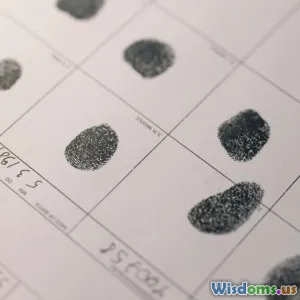
New Frontiers in Criminal Justice
7 min read Explore groundbreaking advances shaping criminal justice through technology, policy, and human rights innovations. (0 Reviews)
New Frontiers in Criminal Justice
Criminal justice is evolving fast, laying down new paths in technology, ethics, and community engagement. These innovative approaches are not just theoretical—they're transforming how crimes are solved, how fairness is ensured, and how society handles rehabilitation. From high-tech forensic tools to a reimagined vision of justice that puts healing before punishment, the field is pushing boundaries in remarkable ways.
The Dawn of Data-Driven Crime Fighting
One of the most significant frontiers in criminal justice is the rise of data analytics and artificial intelligence (AI). Traditionally, law enforcement relied heavily on experience, intuition, and manpower. Today, sophisticated algorithms analyze vast amounts of data, revealing patterns and predicting potential threats.
Predictive Policing's Promise and Pitfalls
Predictive policing models use historical crime data, social media inputs, and geographic indicators to forecast where crimes might occur next. For example, the Los Angeles Police Department employed predictive algorithms to focus patrols, reportedly leading to a reduction in certain crime types. However, critics warn about the risk of perpetuating bias—if flawed data feeds AI, the outcomes may unjustly target marginalized communities.
AI in Forensics: Faster, Smarter Investigations
Forensics benefits tremendously from AI, particularly in fingerprint analysis, DNA matching, and video surveillance. The FBI's Next Generation Identification system exemplifies this, streamlining biometric searches and reducing backlog. Combining machine learning with forensic expertise accelerates investigations, allowing law enforcement to close cold cases that once seemed hopeless.
Restorative Justice: A Paradigm Shift Toward Healing
The traditional criminal justice model—focused on punishment—has faced criticism for failing to reduce recidivism or address victims’ needs fully. Restorative justice offers a new frontier centered on accountability, reparation, and community healing.
What Is Restorative Justice?
This approach brings offenders, victims, and community members together in facilitated meetings to discuss harm caused and agree on resolutions. Programs like New Zealand’s use of restorative practices, especially with juvenile offenders, has led to reduced repeat offenses and increased victim satisfaction.
Implementing Restorative Programs Globally
Countries like Canada, the UK, and some states in the US are integrating restorative justice into their systems, with documented success in lowering costs and improving social outcomes. It requires cross-sector collaboration between police, courts, social services, and NGOs for effective implementation.
Enhancing Transparency with Body Cameras and Open Data
Transparency builds trust. Deploying body-worn cameras in police forces, now widespread in many countries, aims to capture unbiased evidence and discourage misconduct.
Benefits and Challenges
Studies from the Rialto Police Department in California highlight decreases in both complaints against officers and use-of-force incidents when cameras are used consistently. Nevertheless, concerns around privacy, data storage, and the selective release of footage remain active debates.
Open Data Initiatives
Open data portals publishing crime statistics and police performance metrics empower citizens, watchdogs, and journalists to hold systems accountable. For instance, Chicago’s open data platform provides real-time updates on crime, enabling community-driven analysis and advocacy.
Criminal Justice Reform Through Legislative Innovation
Reforms are not just technological. Many jurisdictions are reshaping laws and policies to address systemic issues like mass incarceration and sentencing disparities.
Sentencing Reforms
Several U.S. states, such as Texas and California, have enacted legislation reducing mandatory minimums and expanding alternatives to incarceration, believing in community supervision and rehabilitation.
Emphasizing Mental Health and Substance Abuse Treatment
Recognizing the strong correlation between crime and behavioral health issues, courts increasingly mandate treatment programs rather than incarceration. Drug courts and mental health courts exemplify this shift, reducing recidivism and improving offender well-being.
International Collaboration and Cybercrime Challenges
As crime transcends borders—especially in cyberspace—criminal justice systems face new hurdles requiring multinational cooperation.
Tackling Cybercrime
Sophisticated hackers and fraudsters attack financial institutions, run ransomware, and steal identities. Agencies worldwide use networks like INTERPOL’s Cybercrime Directorate to share intelligence and coordinate operations.
Rule Harmonization and Capacity Building
Harmonizing laws related to digital evidence gathering and extradition is crucial. The Budapest Convention on Cybercrime stands as a key international agreement fostering cooperation.
Conclusion: Toward a Smarter, Fairer Criminal Justice
The new frontiers in criminal justice represent a blend of cutting-edge technology, compassionate reforms, and global collaboration. While exciting, these advances require diligent oversight, ethical frameworks, and community involvement to truly serve justice.
Ultimately, the goal is a justice system that is not only efficient at crime control but also humane, transparent, and geared toward societal healing. As society continues to innovate and adapt, the future of criminal justice promises profound transformations that can redefine safety and justice worldwide.
By embracing these new frontiers, stakeholders—from policymakers to everyday citizens—have a unique opportunity to shape a justice system that reflects both modern realities and enduring human values.
References and Further Reading
- FBI Next Generation Identification System: https://www.fbi.gov/services/cjis/fingerprints-and-other-biometrics/ngi
- Los Angeles Police Department Predictive Policing Study (RAND Corporation, 2013)
- New Zealand Restorative Justice Council: https://www.restorativejustice.org.nz
- Rialto Police Department Body-Worn Camera Study (2012)
- Budapest Convention on Cybercrime: https://www.coe.int/en/web/cybercrime/the-budapest-convention
- Vera Institute of Justice - Sentencing Reform Studies: https://www.vera.org
Rate the Post
User Reviews
Popular Posts




















